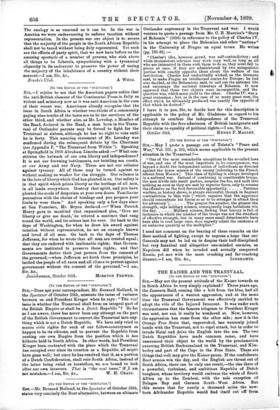[To THE EDITOR OF TILE "SPECTATOR. "] SIR,—May I quote a
passage out of Tolstoi's "Peace and War," Vol. III., p. 265, which seems applicable to the present situation in the Transvaal ?- " One of the most remarkable exceptions to the so-called laws of war, and one of the most important in its consequences, was beyond a doubt the independent action of individuals as directed against the dense masses of the enemy [referring to the French retreat from Moscow]. This class of fighting is always developed in a national war. Instead of combining in considerable troops, the men divide into small parties, surprise the foe, and melt into nothing as soon as they are met by superior force, only to resume
the offensive on the first favourable opportunity Partisan warfare, as history shows. is always successful, though in flagrant contradiction to this rule [' which requires that the aggressor should concentrate his forces so as to be stronger in attack than his adversary'] The greater the number, the greater the strength, says military science, consequently huge battalions win the day Military science, finding that history is full of instances in which the number of the troops was not the standard of effective strength, but in many cases small detachments have been able to rout large ones, does vaguely admit the existence of an unknown quantity as the multiplier."
I need not comment on the bearing of these remarks on the Boer method of fighting, except to express a hope that our Generals may not be led on to despise their half-disciplined but very fanatical and altogether one-minded enemies, as Napoleon did when he invaded and actually conquered Russia, yet met with the most crashing and far-reaching






















































 Previous page
Previous page